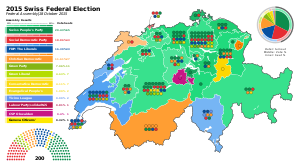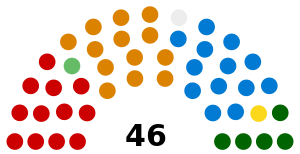
The government of Switzerland is a federal state with direct democracy.

The Federal Council is the federal cabinet of the Swiss Confederation. Its seven members also serve as the collective head of state and government of Switzerland. Since after World War II, the Federal Council is by convention a permanent grand coalition government composed of representatives of the country's major parties and language regions.

The Swiss People's Party, also known as the Democratic Union of the Centre, is a national-conservative and right-wing populist political party in Switzerland. Chaired by Marcel Dettling, it is the largest party in the Federal Assembly, with 62 members of the National Council and 6 of the Council of States.

Elections to the Swiss Federal Assembly, the federal parliament of Switzerland, were held on Sunday, 21 October 2007. In a few cantons, a second round of the elections to the Council of States was held on 11 November, 18 November, and 25 November 2007. For the 48th legislative term of the federal parliament (2007–2011), voters in 26 cantons elected all 200 members of the National Council as well as 43 out of 46 members of the Council of States. The other three members of the Council of States for that term of service were elected at an earlier date.

In Swiss politics, the magic formula is an arithmetic formula for dividing the seven executive seats on the Federal Council among the four coalition parties. The formula was first applied in 1959. It gave the Free Democratic Party, the Catholic Conservative Party and the Social Democratic Party two seats each, while the Party of Farmers, Traders and Independents received one seat.

Eveline Widmer-Schlumpf is a Swiss politician and lawyer who served as a Member of the Swiss Federal Council from 2008 to 2015. A member of the Swiss People's Party (SVP/UDC) until 2008, she was then a member of the splinter Conservative Democratic Party (BDP/PBD) until 2021, when that party merged into The Centre. Widmer-Schlumpf was the head of the Federal Department of Justice and Police from 2008 to 2010, when she became head of the Federal Department of Finance. She served as President of the Swiss Confederation in 2012.

The Conservative Democratic Party of Switzerland was a conservative political party in Switzerland from 2008 to 2020. After the 2019 federal election, the BDP had three members in the National Council.
An election for all seven members of the Federal Council, the government of Switzerland, was held on 14 December 2011, following the federal election on 23 October 2011. Micheline Calmy-Rey announced she would not run for re-election to the council. According to a traditional informal convention, the successor has to come from the French-speaking or Italian-speaking part of Switzerland. The candidates for her post announced by their respective cantonal sections are Alain Berset (Fribourg), Pierre-Yves Maillard (Vaud), Stéphane Rossini (Valais), and Marina Carobbio (Ticino).
The 2007 Zürich cantonal elections were held on 15 April 2007, to elect the seven members of the cantonal Executive Council and the 180 members of the Cantonal Council.

Guy Bernard Parmelin is a Swiss Federal Councillor and head of the Department of Economic Affairs, Education and Research. A member of the Swiss People's Party (SVP/UDC), he has been a member of the Federal Council since 2016, and has led the Department of Economic Affairs, Education and Research since 2019. He previously led the Department of Defence, Civil Protection and Sports between 2016 and 2018. He served as president of Switzerland in 2021, having previously served as vice president of Switzerland in 2020.
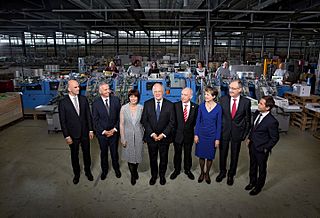
An election for all seven members of the Federal Council, the Government of Switzerland, was held on 9 December 2015, following the federal election on 19 October 2015, for the 2016–2020 term.
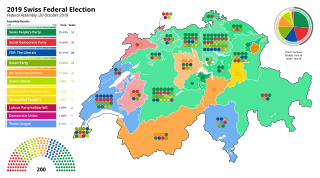
Federal elections were held in Switzerland on 20 October 2019 to elect all members of both houses of the Federal Assembly. This was followed by the 2019 election to the Swiss Federal Council, the federal executive, by the United Federal Assembly.
An election for all seven members of the Federal Council, the Government of Switzerland, was held on 11 December 2019, following the federal election on 20 October 2019, for the 2020–2024 term.

Federal elections were held in Switzerland on 22 October 2023 to elect all members of the National Council and Council of States. The elections were followed by elections to the Federal Council, Switzerland's government and collegial presidency, on 13 December.
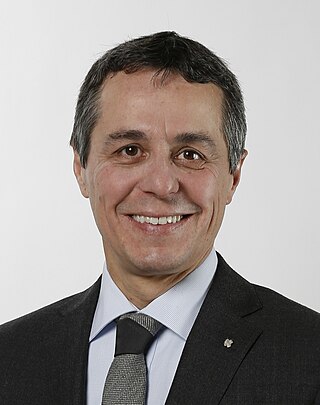
A by-election to the Swiss Federal Council was held on 20 September 2017, after federal councillor Didier Burkhalter (FDP-NE) announced he would leave the Council effective 31 October 2017. The by-election resulted in the election of Ignazio Cassis (FDP-TI), resulting in no change in the partisan composition of the council.
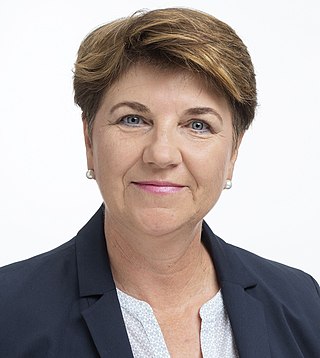
By-elections to the Swiss Federal Council were held on 5 December 2018, after federal councillors Johann Schneider-Ammann (FDP-BE) and Doris Leuthard (CVP-AG) announced in September they would leave the Council effective 31 December of the same year.

By-elections to the Swiss Federal Council were held on 7 December 2022, after federal councillors Ueli Maurer (SVP-ZH) and Simonetta Sommaruga (SP-BE) announced they would leave the Council effective 31 December of the same year. The parliament elected Albert Rösti and Élisabeth Baume-Schneider respectively to replace them.
An election for all seven members of the Federal Council, Switzerland's government, were held on 13 December 2023 for the 2024–2028 term. It followed the federal election held a month earlier and partly depended on its results.

The 2019 Zürich cantonal elections were held on 24 March 2019, to elect the seven members of the cantonal Executive Council and the 180 members of the Cantonal Council. All five incumbents running were re-elected to the Executive Council, as well as green candidate Martin Neukom and Swiss People's Party candidate Natalie Rickli.


